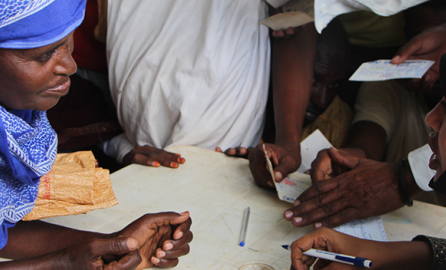With over a billion people unregistered and lacking proper identification globally, civil registration has an essential role to play in development. The benefits to be gained from a functioning civil registration system are substantive – however, the complexities of implementation must be overcome before they can be reaped. Find out how the European Commission approaches civil registration and what leading experts have to say on implementing successful civil registration systems.
A rights-based focus
Currently, over 1.1 billion people cannot officially prove their identity according to World Bank statistics, with 40% of those without identity being under the age of 18. A push for civil registration is a step in meeting the Sustainable Development Goal 16.9, which sets as target the provision of a legal identity for all, including birth registration, to be reached by 2030.
From an individual’s access to education, social services and healthcare, to their right to vote, civil registration is a prerequisite in ensuring that no one is left behind. “We believe it’s important to be registered as soon as you’re born,” said Laura Bretea, Policy Officer on Democratic Governance at the European Commission’s Directorate-General for International Cooperation and Development (DG DEVCO).
In contrast to short-term approaches to registration, such as holding registrations for elections, a civil registration system provides for a more holistic view of a population, Bretea explained. Civil registration encompasses the vital events in individuals’ lives, from their birth to their death, and other key events such as marriage, divorce and children. “Civil registration is important because it gives identification to people, which then facilitates access to socio-economic rights and entitlements,” explained Bretea.
While civil registration can benefit societies’ most vulnerable, its implementation can have pitfalls, which need to be mediated. Accordingly, civil registration is housed within DEVCO’s Unit on Human Rights and Democratic Governance. “We encourage countries to have data protection laws,” Bretea said. “We also only support projects where no mention of ethnicity is made on identity cards, to avoid the targeting of minorities.”
Prioritising engagement
According to Bretea, donors used to approach civil registration from other entry points, such as voter registration. Voter registers, however, often failed to be transformed into civil registration systems once the exercise was complete. Bretea explained that this led to a new approach for DEVCO of prioritising civil registration as an end in itself, in order to ensure the sustainability of registration systems.
“We have to convince people that it’s more important to have a population register from which you can extract information when you need it, rather than to finance a new registration initiative, such as voter registration, every four years and be trapped in this cycle,” she said.
Under the new approach, Bretea gave the example of Burkina Faso, where DEVCO is involved in a civil registration project working with family planning to register children and examine demographic trends. “Another project, in Mali, which builds on the work local authorities conducted with biometrics, will take another 3 to 4 years, but the hope is that it will cover the whole of the population when completed,” she said.
With a focus on rights at its core, interest in civil registration by EU Member States has been increasing, especially in relation to donor coordination, the use of technology, and its impact on good governance. “The issues we address extend beyond individual rights,” Bretea explained, citing examples of assisting governments in finding solutions to technical problems, such as addressing vendor lock-in.
Watch Laura Bretea discuss the European Commission’s approach to registration here:
Long-term benefits and short-term challenges
For Frank Nan, civil registration expert with over 20 years of experience, civil registration is central to effective public administration and provides clear benefits. Due to continuous registration of vital events, it allows for a better understanding of the demographics and needs of a population. This in turn provides better input for budget use by government when compared to use-based registration approaches, such as voter registration.
“Civil registration in itself can lead to accountability, for the government and the population, as both have rights and obligations” he said. “Good registration can result in budget revenue for the government, i.e. through better data sharing within public administration, leading to efficient taxation or preventing the misuse of social benefits. On the other hand, registration by citizens enables and obliges governments to provide good and reliable services for them.”
Other benefits can be seen in the realm of migration, he explained. If the needs of a population are understood through registration, they can in turn be met, increasing the quality of life in a region and decreasing emigration rates of trained and qualified people.
The main difficulties with civil registration projects, according to Nan, lie in convincing governments of their necessity and in obtaining political commitment. “As an implementing instrument, civil registration is mostly happening under the water – you don’t see direct results,” Nan explained. “This makes it difficult for governments to sell civil registration to their electoral base.”
Compared to tangible, though short-term investments, such as roads or buildings, implementation of civil registration systems is a lengthy and costly process. Besides being costly, civil registration can be a sensitive issue when related to voter registration, which may raise political objections for implementation.
Sustainable systems
Ultimately, the mark of a successful civil registry implementation is that donor countries should be able to conclude their involvement, while ensuring that the government is able to continue with the management of the system. The sustainability of civil registration systems, Nan argued, should be prioritised as the focus of implementation due to how much they cost. “This is a target that the EU is taking seriously,” he added.
“Sustainability means starting at the source to ensure that efforts are not being duplicated and capacities are not lost,” Nan said. With this in mind, differences in the capacities mean that Member States need to adapt their approach to the realities on the ground to reach functional and lasting solutions; “Implementation must be flexible, while never losing sight of the overarching concept,” he explained.
Over the longer term, sustainability also means creating public trust in civil registry systems and ensuring the firm grounding of registry systems in a rights-based framework. This encompasses educating ministries on data protection and ensuring non-exclusionary treatment of minorities, said Nan. “Governments need to understand that this is central to implementation.”
Watch Frank Nan discuss challenges to civil registration systems and approaches to overcoming them:
Managing implementation
Jaap van der Straaten, the Chief Executive at the Civil Registration Centre for Development (CRC4D) explained that there are six key elements to keep in mind in implementing an effective, integrated civil registration and identification system, summarised in his ‘six I’s strategy’.
These include the provision of adequate Investment for the development of a registration system and the use of digitisation (ICT) to bring systems into the 21st century, including to avoid data loss – as in the case of Central African Republic, which lost 70% of its records during a civil war. The Interoperability of systems was further stressed, as these need to work with in-country partners, such as the health service or the justice sector, to register vital events.
Van der Straaten also argued for the Integration of civil registration and civil identification (national ID) systems covering vital events, to avoid duplication of information on individuals and data loss. People must have Incentives to register, while disincentives, such as cost, should be minimized – van der Straaten referred to South Africa, where child support has helped move the country from 20% birth registration to universal coverage. Finally, countries need to be Inventive in finding ways to overcome specific challenges they face.
Watch Jaap van der Straaten talk through the 6 I’s here:
Concluding thoughts
Both van der Straaten and Nan agreed on the barriers to implementing civil registration systems, and see political will as a first step. “Many governments’ initiate registration campaigns as a way of achieving one-off gains,” van der Straaten explained. “This is like taking a picture of a river – you see the river, but not the current.” The problem with voter registration for example, he added, is that if it’s done every four to five years, up to 25 percent of the database will no longer be valid, due to new people coming of age and others dying between elections.
Once political will is secured, it’s important to make sure comprehensive working methods exist between governments and donors, and that donors fully understand the concept of civil registration. “It’s important to share good practices and have people come together to discuss,” van der Straaten said, adding that this includes the private sector as well. Stakeholders must ensure that systems are not funded in a fragmentary way (for example, with funds only allocated for birth registration) and, when possible, work together to avoid funding gaps.
The benefits extend beyond questions of rights, governance, and savings, van der Straaten added. Civil registration systems and national IDs have become ever more important over the last two decades for reasons of national and international security. When linked to mobility, international regulations, and the use of identity for government and private sector service delivery, the utility of civil registration systems far outweighs their cost.
Image credit: A. Delafortrie/EU/ECHO via Creative Commons license 2.0
This article was written by Craig Hill, Journalist and Content Editor at Capacity4dev, with input from DG DEVCO.






Log in with your EU Login account to post or comment on the platform.